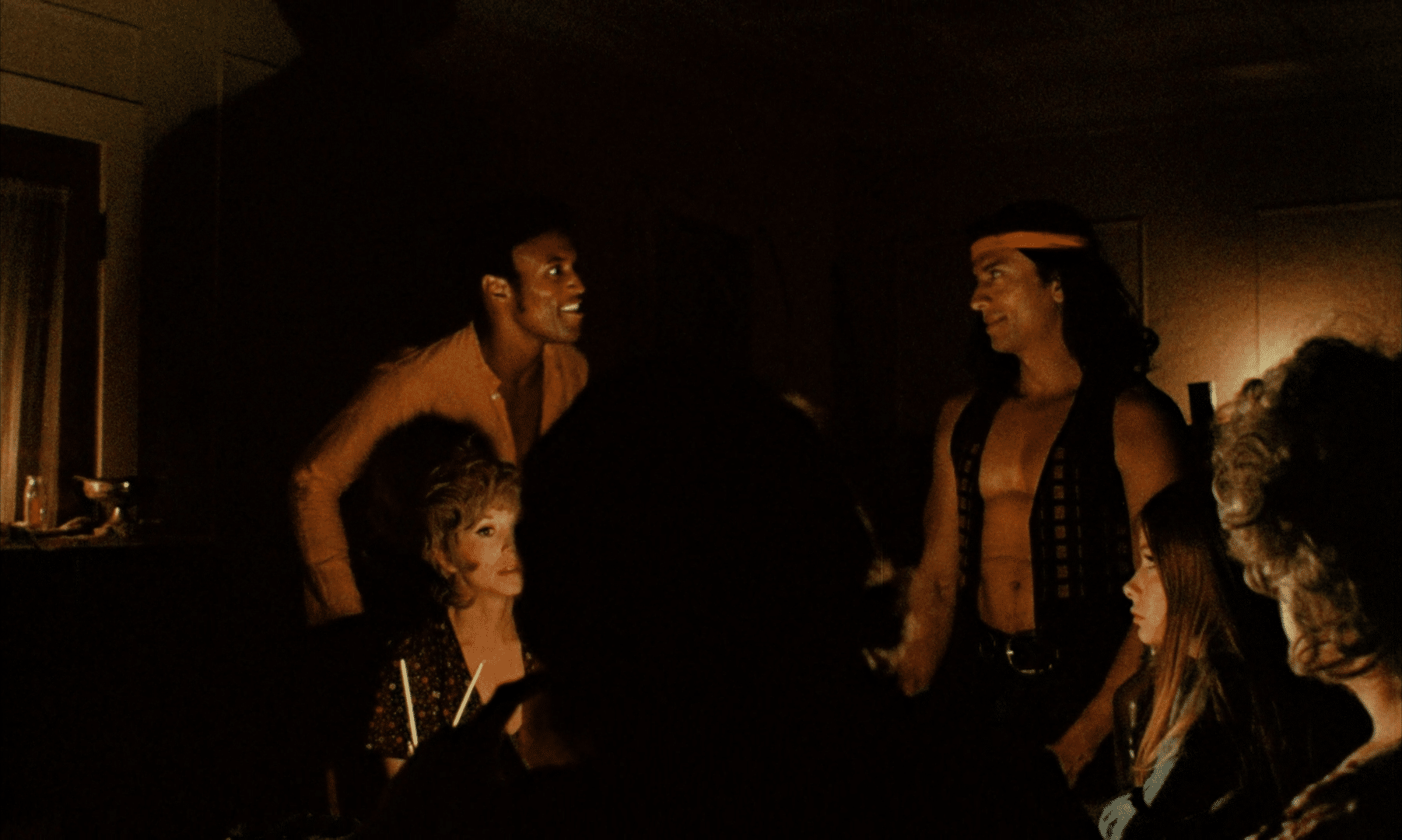
Charles Manson gave hippies a bad name, and schlock cinema responded accordingly.
The fascination with Charles Manson is one of the most bizarre phenomenons in American history. Morbid curiosity is one thing, but the media and pop culture’s obsession with this particular white supremacist and murder mastermind has kept him in the spotlight for over half a century.
Why is that?
As human beings we’re drawn towards what we fear and don’t understand. Serial killers, cult leaders, and true crime are constantly mined by creative types looking for inspiration because audiences are intrigued by wicked people and their demented deeds. Writing for Psychology Today, criminologist Scott A. Bonn highlighted some factors which contribute to the appalling allure of human evil: “Serial killers are transformed into larger-than-life popular culture celebrities through the combined efforts of law enforcement authorities, the news and entertainment media, and the public’s appetite for the macabre.”
But why do we have an appetite for the “macabre?” Are we sick freaks?
Psychologist Carl Jung believed that understanding evil was key to controlling our personal “shadow” — the dark side of our personality. Therefore, probing disturbing subject matter is beneficial to our growth as human beings: “One does not become enlightened by imagining figures of light,” he wrote, “but by making the darkness conscious.”
Pop culture, especially horror, provides us with a healthy outlet to do just that. And given that Manson is a true embodiment of evil who’s attained celebrity status, he’s remained one of entertainment’s most prolific bogeymen.
Along with his followers, he’s influenced numerous filmmakers, writers, musicians, entertainers, and artists. He’s been the subject of movies and books, including the popular “Helter Skelter” (named after The Beatles’ song of the same name, which Manson thought was prophecy about a race war). As far as I’m aware, he’s the only serial killer to ever appear on the cover of Rolling Stone and have his songs performed by Guns n’ Roses. Recently, he featured in American Horror Story: Cult, and the horrific murders of Sharon Tate and her friends will play a part in Quentin Tarantino’s next movie. He might be dead, but pop culture’s warped fascination with the man and his tribe hasn’t followed him to the grave.
The Manson Family’s ritualistic murders were carried out in August, 1969 and triggered the initial stages of national cult hysteria — which reached its apex in the 70’s and 80’s with the Satanic Panic epidemic. The media had a field day with the murders: news stories started framing the hippie community as violent and debauched criminals. Shortly after, alleged killings involving more hippies haunted the headlines, often blaming LSD and other psychedelic drugs for turning people into blood-thirsty lunatics.
Suddenly, the straight society who opposed the socially progressive counter-culture and their antiwar efforts had further reason to condemn it. Murder fueled by radical cult beliefs and hallucinogenic substances was topical heading into the early 70’s, so naturally opportunistic exploitation filmmakers milked the sensationalized moral panic for all it was worth. What followed was a slew of low budget schlock movies featuring hippie cults led by figures reminiscent of Manson, with some vampires, Jesus freaks, and other nasties thrown in to ensure the wildest time possible.
But Even before Manson’s arrest and subsequent conviction, exploitation films had been painting the hippies in a poor light since the late 60’s. Often, they’d pose as warnings against drug use and hedonism while simultaneously embracing the titillation that came with movies about sex and getting high. They also had a tendency to portray hippies as criminals, sometimes even capable of taking lives. Take 1967’s Hallucination Generation for instance, which follows a group of beatniks in Spain as they drug it up and embark on crime spree, including murder. If anything, the murders carried out by Manson’s minions reinforced negative stereotypes and attitudes people already held about hippies anyway.
Exploiting the anti-hippie wave was nothing new in Hollywood. It just got much sleazier, weirder, and nastier after Manson got caught.
“Let it be known, sons and daughters, that Satan was an acid head. Drink from this cup; pledge yourselves. And together, we’ll all freak out.” – I Drink Your Blood
I Drink Your Blood is the Citizen Kane of movies about homicidal satanic hippies with rabies. Conceived by writer-director David E. Durston during the height of the Manson trial’s news coverage in 1970, the film follows a sadistic mixed race gang of miscreants who terrorize a small town and force an elderly man to take LSD. Sick of their shit, his young grandson decides to kill a dog so he can inject its blood into some meat pies and infect the invaders, thus turning them into flesh-hungry cannibals. The little nuisance didn’t count on that happening, did he now?
Due to the film’s excessive violence, I Drink Your Blood was one of the first movies to receive an X-rating from the Motion Picture Association of America. You can also imagine how shocking and tasteless it must have been in the early 70’s when Manson’s crimes were at their most resonant among the public. But it merely the start of this shameless breed of exploitation movie which sought to milk the terrifying image of hippies in the public’s imagination.
I Drink Your Blood’s gruesomely groovy gang were in league with the devil, but the sleazeballs in 1971’s The Night God Screamed carry out their crimes in the name of the Almighty. Here, a group of Jesus-loving hippies, led by their own enigmatic leader and warped view of Catholicism decide to crucify a preacher in his own church. After they’re sentenced to death, the religious maniacs vow to torment his widow (played by the Academy Award nominee Jeanne Crain, whose performance makes this movie better than it should be). Naturally, they come back when the sun goes down, heaven-bent on getting revenge in the name of their dude.
In The Deathmaster, things get a little more supernatural. Released in 1972, the film blends the lingering real-life horror of the times with a good old fashioned vampire tale. Proceedings get underway with a coffin washing up on the shore of a Californian beach, which we later discover belongs to the vampire Khorda (Robert Quarry). Shortly after, he infiltrates a commune of directionless young hippies and gives them good advice and purpose in life. Little do they know that they’re being manipulated into joining his coven of bloodsuckers to carry out nefarious deeds.
Not all movies are rooted in fiction, though. One of the more direct Mansonsploitation films is The Other Side of Madness, which sought to retell the Tate-LaBianca murders through a combination of surreal re-enactments and real footage of the Family. It was produced cheap and fast and released in 1971 to cash in on the Manson’s conviction. The film features scenes of the race war Manson envisioned as well, making it part faux doc, part outlandish attempt to capture the psych of a madman. No one ever accused these movies of being sensitive, and The Other Side of Madness is a blatant attempt to capitalize on shock and hysteria at its peak if there ever was one. At the time, it was probably quite chilling, weird, and offensive.
I could go on — Terror on the Beach, The Peace Killers, The Love-Thrill Murders, The Cult, Sweet Savior — but you get the idea. Manson made hippies scary for awhile, but I don’t think it’s a coincidence that 70’s horror movies featuring hooded devil covens, witches, and the occult emerged shortly after he was convicted either. Manson and his apostles triggered a public frenzy pertaining to cults that would reach ridiculous new heights in the 80’s with the Satanic ritual abuse allegations, which inspired their own exploitation movies as well.

